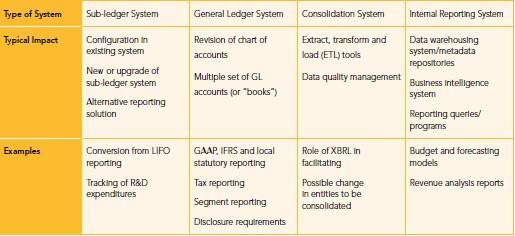USCPA考试信息技术IFRS内容转换思考(二)
Background of IFRS&IT Impact
Today,more than 100 countries require/permit the use of International Financial Reporting Standards(IFRS),or are converging with the IASB's standards.On February 24,2010,SEC Chairman Mary L.Schapiro released a public statement regarding IFRS convergence between International Accounting Standards Board(IASB)and Financial Accounting Standards Board(FASB):For nearly 30 years,the Commission has promoted a single set of high-quality globally accepted accounting standards,which would advance the dual goals of improving financial reporting within the U.S.and reducing country-by-country disparities in financial reporting,but supporting this goal is only the beginning of the discussion,not the end.
In the USCPA IFRS Preparedness Survey conducted in September 2009,a 54% majority of CPAs believed that the SEC should ultimately require adoption of IFRS for U.S.public companies.Furthermore,over 50% of respondents expressed a need to know some level of IFRS over the next three years.However,with these uncertainties surrounding U.S.CPAs and SEC's decision to mandate IFRS for U.S.public companies,some organizations question,why convert to IFRS?
·Considerations for filing of IFRS financial statements include:
·Multinational companies may benefit from the use of common financial reporting systems
·IFRS may ease financial statement comparability with other companies that use IFRS
·IFRS is intended to facilitate cross-border investments and access to global capital markets
Other key benefits include opportunities to improve/streamline business functions and processes,globally integrate the financial IT systems,and achieve consolidation/reporting efficiency.On the other hand,there are risks associated when a company decides to convert to IFRS.Some of these risks are excessive resource spending,improper data management or migration,incomplete revisions of policies and procedures,future changes that standard setters may issue,and more.
While there are many benefits and risks to converting to IFRS,a few key factors should be taken into consideration prior to implementation or during project planning.Although the IASB and FASB are working toward convergence,there are currently many differences between the two sets of standards(see Key Differences between IFRS and GAAP below).It will be important to monitor the changes as the two boards complete their joint work plan as outlined in their Memorandum of Understanding.Furthermore,companies should first assess which principles/standards will impact their organizations directly,conduct some research,and have a strong understanding prior to implementation.A detailed discussion regarding project planning is further explored under Implementation Considerations.
Potential System Impacts of an IFRS Conversion
As a company prepares to convert to IFRS,the impact to information technology(IT)and financial systems should be taken into consideration during the planning phase.Representatives from the company's IT department should be involved throughout the planning process to evaluate how the proposed accounting changes will impact the financial systems(transactional or reporting).
The impact to IT and financial systems can vary depending on a company's existing structure and environment.This may include its IT and financial systems capability/integration,industry complexity,company size,relevance of business process/transaction,internal control structure,mergers&acquisitions process,and other attributes.
If a company's IT and financial systems are substantially integrated globally,then the degree of impact or modifications may be of lesser extent.The extent of changes may be primarily some sub-ledger configuration changes and more extensively in the general ledger and consolidation system.However,if a company has frequently acquired entities(each with unique financial systems)and has not yet integrated the acquired company systems within the organization's infrastructure,then the degree of system impact may be quite large at the sub-ledger level as well as the internal reporting level.
The extent of changes may also vary depending on the consolidation method that management chooses.Consolidations may be implemented at the corporate-level or at each individual country/entity.However,companies that implement at the corporate level may potentially run the risk of error and potentially re-stating its financial statements as well as other situations if the numerous journal entry adjustments are not tracked or controlled properly.Furthermore,if a dual reporting system is in place during the transition period,the reconciliation process needs to be taken into consideration.Reconciling between two differentviewsof the financial statements poses different problems than singularly supporting of one or the other.Therefore,having an effective reconciliation reporting system is an important aspect to the learning curve of the IFRS transition.
While system changes will have costs associated with them,some companies or the management team may view the IFRS conversion project as an opportunity to re-assess and improve the internal business processes.It will be up to the organization to determine which path to choose,and the outcome associated with the path.Below is a chart that highlights some of the impact to IT and financial systems.
If the company is ready to convert to IFRS,it's important to ensure that the company has good change management policies and procedures in place.Having strong policies and procedures will be beneficial if further system revisions are required and traceable for internal control purposes.Refer to Implementation Considerations below for more details about impact to Internal Controls.
Exhibit 1
Potential System Impacts During IFRS Implementation



















